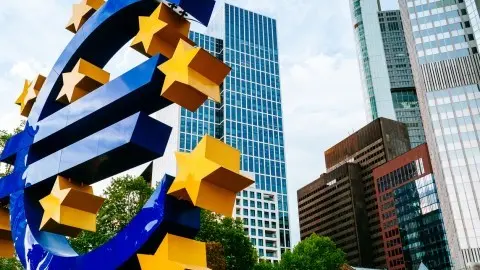Eurozone economy ends 2017 with a bang
The Economic Sentiment Indicator ends 2017 on a high note but the inflation picture still remains muted
The Eurozone economy is going from strength to strength. The European Commission’s economic sentiment indicator (ESI) surged to 116 in December from 114.2 in November, which is way above the 114.8 consensus expectation. The Business Climate Indicator rose to 1.66, hitting its highest level since 1985.
With the growth picture looking very strong, calls to end the ECB’s expansionary monetary policy will only grow louder
There was a sentiment improvement in all sectors (industry +1.0, services +2.0, retail trade +1.9, construction +1.2 and consumer confidence +0.5). But the country breakdown revealed a strong increase in sentiment in Germany +1.6 and France +2.3.
Amongst the other large euro-area economies, the ESI rose in the Netherlands (+0.7), while it remained unchanged in Italy (0.0) and slightly decreased in Spain (-0.8). One should also note that the sentiment indicator is now above its long-term average in Greece.
The Eurozone economy is definitely gaining momentum and a GDP growth figure this year at or above 2017’s expected 2.4% cannot be dismissed as a fairy tale. However, the inflation story remains more of a mixed bag.
As we saw last week, core inflation still remains too low to get comfortable, and the Economic Sentiment Indicator doesn’t shed any more light on this matter. Some pipeline inflation is starting to show as selling price expectations increased strongly in the industry and to a lesser extent in construction. But at the same time selling expectations fell slightly in services and retail sales, while the consumer is also pencilling in fewer price increases over the next 12 months.
With the growth picture looking very strong, the calls to end the ECB’s expansionary monetary policy will grow louder.
On Sunday the president of the Bundesbank, Jens Weidmann in an interview with the Spanish daily El Mundo said that the ECB should set an end date for its asset-buying program. That said, a majority within the Government Council will want to avoid the repeated mistake of premature tightening, certainly given the stubbornly subdued inflation dynamics.
We still expect a short lengthening of the asset purchase program until December 2018, to allow further tapering. While net asset purchases will definitely have ended in the first quarter of 2019, a first rate hike might have to wait until next years summer.
This publication has been prepared by ING solely for information purposes irrespective of a particular user's means, financial situation or investment objectives. The information does not constitute investment recommendation, and nor is it investment, legal or tax advice or an offer or solicitation to purchase or sell any financial instrument. Read more
Download
Download snap
8 January 2018
Where next for Europe in 2018? This bundle contains 5 Articles